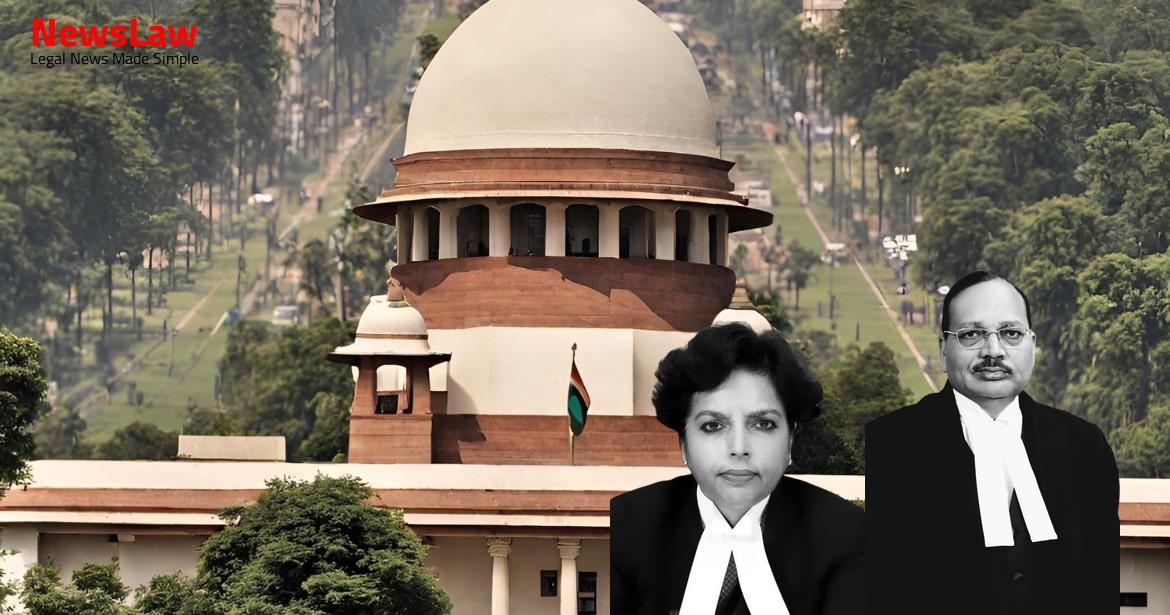In a significant ruling by the Supreme Court of India, the case pertaining to cheque bounce and debt repayment between two parties has been resolved. The judgement underscores the importance of legal presumptions under the Negotiable Instruments Act, shedding light on the liabilities of individuals in financial transactions. This ruling has far-reaching implications for future cases involving similar issues.
Facts
- The present appeal arises out of the Final Judgment dated 29.01.2020 passed by the learned Single Judge of the High Court of Judicature at Madras.
- The High Court dismissed the appellant’s appeal in Criminal Appeal No.582/ 2012.
- The Appellate Court, in a judgment dated 20.06.2012, acquitted the accused by holding that the cheque was not issued towards a legally enforceable liability.
- The appellant filed Criminal Appeal No.582/2012 in the High Court against the judgment passed by the Appellate Court.
- The accused filed Criminal Appeal No.186/2010 in the Appellate Court challenging the conviction and sentence and filed a petition under Section 391 of the Code of Criminal Procedure for letting in additional evidence.
- The Appellate Court allowed the petition under Section 391 of the Code to introduce additional evidence.
- The complainant challenged this order before the High Court, which confirmed the decision of the Appellate Court to allow the additional evidence.
- Before the Appellate Court, the accused presented evidence and marked exhibits to demonstrate substantial amounts repaid to the complainant.
- The Trial Court convicted the accused under Section 138, N.I. Act and sentenced him to one year simple imprisonment and a fine of Rs. 38,00,000/- as compensation to the complainant.
- The accused borrowed loan amounts totaling Rs.21,09,000 from the chitfund company over a period of about two years.
- The loans were given on multiple dates, starting from 09.03.1995 to 24.04.1997.
- No witness was examined on behalf of the accused, but five exhibits were marked.
- A statutory notice was issued by the chitfund company on 20.02.2003, which the accused replied to on 27.02.2003, repudiating the debt.
- The complainant filed a case under Section 138 of the Negotiable Instruments Act, 1881, after the cheque presented was returned with ‘Account Closed’ endorsement.
- Cheque No.0150573 dated 03.02.2003 was issued by the accused for Rs.19,00,000 to partly discharge the loan amounts.
Also Read: The Case of A.S. Raghavendra vs. The M/S Bharti Airtel Limited: Workman Status Dispute
Arguments
- Appellate Court and High Court erroneously upheld by failing to appreciate the presumption under Sections 138, 139, and 118(a) of the N.I. Act regarding issuance of cheques.
- The burden on the respondent to rebut the presumption was not discharged even after the plea for additional evidence under Section 391 of the Code.
- Two Courts found the appellant unable to show that the cheque amounts were legally due, which may not be reversed by this Court.
- Benefit of doubt given to the respondent regarding discrepancies in figures on the cheque and Statement of Accounts.
- The respondent before the Trial Court denied the existence of a loan transaction between the parties.
- However, before the Appellate Court, the respondent submitted additional evidence in the form of receipts to show repayment of the loan.
- The court held that an offence under Section 138 of the Negotiable Instruments Act is committed when a cheque issued by the accused for debt repayment bounces due to insufficient funds.
- The cheque in question was issued as a result of the respondent’s failure to repay the loan from the appellant, which included interest, thus confirming the offence.
Also Read: Date of Birth Discrepancy: Barsua Iron Ore Mines v. Employee
Analysis
- The closure of the bank accounts shortly after issuing the cheque raises suspicions about the respondent’s intentions.
- The respondent failed to produce receipts proving full repayment of the loan amount as noted by the Appellate Court.
- It was expected that the respondent, upon claiming repayment, should have taken back the cheques or instructed the bank not to honor them.
- Discrepancies in the interest rates (1.8%, 2.4%, or 3% per month) do not discredit the appellant’s claim as the principal amount was not disputed.
- The rate of interest in the pronote already exceeded the cap of 12% per annum prescribed in the Tamil Nadu Act.
- Faulty reasoning by the Appellate Court in considering the Tamil Nadu Act, as the pronote itself exceeds the legal interest cap.
- Once pronotes have been issued, the party cannot take a plea in collateral proceedings regarding interest rate.
- The party cannot argue that the interest rate exceeded permissible limits under a specific Act after issuing pronotes.
- Specifically, in this case, the party cannot claim the interest rate was more than what was allowed under the Tamil Nadu Act.
Also Read: Police Excesses Case: Somnath vs. The State Of Maharashtra & Ors.
Decision
- The Appellate Court’s order and impugned judgment are set aside.
- Both parties are responsible for their own costs.
- Original fine amount ordered is set at Rs.28,50,000/-.
- The respondent, aged 86 and with an elderly wife, is directed to pay the fine.
- The Trial Court’s order is restored with modifications.
- Imprisonment sentence is waived upon payment within eight months.
- Failure to pay will result in a one-year sentence of simple imprisonment.
Case Title: SRI SUJIES BENEFIT FUNDS LIMITED Vs. M. JAGANATHUAN (2024 INSC 602)
Case Number: Crl.A. No.-003369-003369 – 2024



